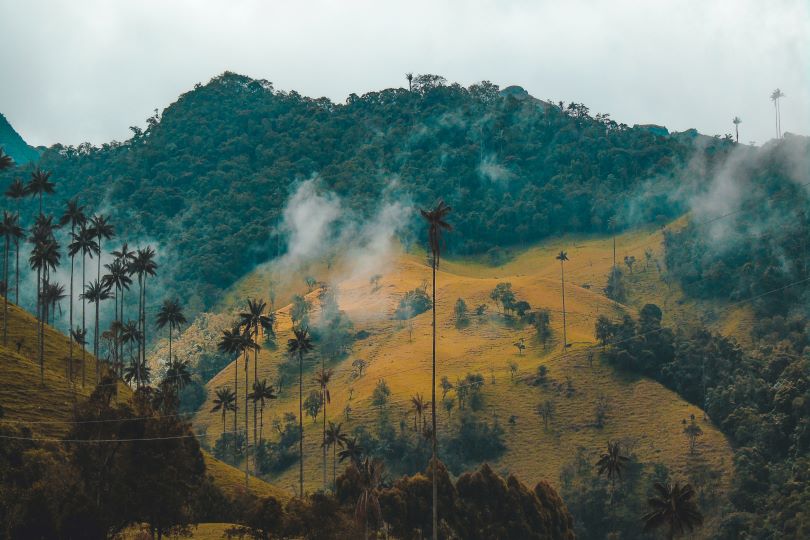The exploitation of the setting has at all times been carefully tied to motion of worldwide capital (Wright and Nyberg 2015:98). The problem of sustainable improvement has develop into central to understanding the up to date world political financial system (GPE), nonetheless this debate has largely been predicated on the assumptions of neoliberal, colonial-centric constructions of the issue (Okereke 2007:4). This implies the options proposed have been focussed on a top-down strategy to local weather coverage that protects the hierarchical established order, which decontextualises the historic processes which have led to local weather change (Parks and Roberts 2010:148). Local weather debt presents a counter-hegemonic framework that addresses the gross energy imbalances which were cultivated by a world political financial system reliant on the exploitation of Indigenous land and sources (Warlenius 2018:138).
Latin America supplies an particularly related context for the implications of a local weather debt scheme given its traditionally excessive ranges of international debt and its important contributions to the worldwide export of pure sources (Perreault 2018:423) at the price of the area’s biodiversity and Indigenous peoples (Fletcher 2018:409). The primary part of my essay can be characterising the disproportionate hurt skilled by Indigenous Latinx peoples as a result of local weather change and situating this hurt traditionally to colonialist state-building. I’ll then go on to discover fashions for instituting a local weather debt scheme because it pertains to the theoretical foundations of counter-hegemonic world techniques idea. Lastly, I’ll analyse the potential implications of a local weather debt scheme for Indigenous Latin People.
The Disproportionate Affect of Local weather Change on Indigenous Latinx Peoples
It has been well-established that the results of extra frequent pure disasters, speedy environmental degradation and more and more unreliable entry to pure sources similar to water will trigger – and certainly, are already inflicting – important insecurity to the livelihoods of these dwelling within the majority world (Roberts and Parks 2009:386). The disproportionate affect of local weather change on growing international locations has occurred due to the ‘colonial energy matrix[‘s]’ (Quijano 2000:23) determination to create a GPE based mostly off the exploitation of the labour, land, and pure environments of the growing world (Robert and Parks 2009:391). Characterising these impacts as ‘disproportionate’ is reflective of the unequal trade of environmental bads skilled by growing international locations in comparison with the profit they obtain from the extractivist practices of pure sources and world meals manufacturing (Claudio 2007:503). The expertise of Indigenous peoples in Latin America clearly displays this actuality. Reyer et al.’s examine of the impacts of local weather change on Latin America and the Caribbean discovered that even with a marginal enhance in world temperature of 0.5 levels Indigenous populations will doubtless see agricultural devastation, the depletion of pure sources integral to Indigenous practices, and the breakdown of conventional information techniques as a result of excessive climate occasions inflicting mistrust within the credibility of elder information and the chance of group leaders dying from environmental ills (Reyer et al, 2015:1602).
Colonial processes of enlargement have essentially formed the event of not solely Latin American economies, however certainly the very existence of Latin American nation-states (Muelle 2019:54). Put up-colonial theorists emphasise the decentring of the state because the central unit of research throughout the GPE in recognition of the function nation-state narratives have performed in upholding the “fashionable/colonial capitalist/patriarchal world-system” (Grosfoguel 2011:11) at the price of all different methods of realizing the world. The observe of statecraft is inherently grounded within the exploitation of the Indigenous ‘different’ because the safety of the state subsumes the safety of Indigenous governance constructions and political energy (Gomez and Sawyer 2012:33). The state turns into naturalised by the legitimising of sure methods of current in house over others (Soja 1980:209). Feminist idea demonstrates that by treating the state as a impartial object moderately than a subjectively constituted, discursive instrument the harms state constructions produce is obscured (Haraway 1988:599). Within the case of Latin America, the accountability of local weather degradation is due to this fact handled as both a obligatory loss within the safety of the reified state or an overreaction to a pure world the state clearly controls.
By way of a means of delegitmisation Indigenous peoples’ methods of constituting house has been relegated to an essentialised mythology that belongs to the previous, moderately than a physique of dwelling knowledges that should maintain weight in up to date coverage creation (Fabricant 2013:160). The function of Indigenous Latinx populations of their colonial historical past has been dynamic, lively and heterogenous. It has concerned Indigenous peoples being ‘pulled into exploitative relations with capitalism participating it, resisting it, and posing options to it’ (Postero 2018:50). This variety of expertise has been swept up into neoliberal multicultural narratives which have enabled Indigenous peoples to self-determine based mostly off their ‘personal imaginative and prescient of improvement’ (Postero 2018:50). Nonetheless, these visions have constantly been constrained by the colonial venture of ‘world capital and the sovereign nation-state’ (Postero 2019:50). Indigenous peoples try and assemble a relationship to the world located inside Indigenous knowledges of land and place has been opposed by nationwide and worldwide governance establishments. These establishments are maybe extra fascinated about persevering with their insurance policies of extractivism within the identify of improvement and the service of monied company pursuits (Andreucci 2017:171).
Making use of Counter-Hegemonic Principle to the International Local weather Disaster
In contrast to many different conceptual local weather frameworks, which had been first developed by lecturers after which utilized to native communities, local weather debt had a ‘bottom-up improvement amongst Southern and Northern NGOs’ (Rice 2009:246). Local weather debt first entered the literature in reviews produced by Chilean NGO, Instituto de Ecologia Politica within the early 90s (Martinez-Alier 2002:213) and it has continued to be co-opted by NGOs and civil society since (Paredis et al. 2009:4). The premise of local weather debt is that developed international locations have materially benefitted from their ‘useful resource plundering, environmental[ly] damag[ing practices], and the free occupation of environmental house to deposit wastes, similar to greenhouse gases, from the [majority world]’ (Acción Ecológica 1999:23), and this debt should be renumerated. The important thing limitation nonetheless to local weather debt as a coverage proposal is the literature is fully unclear on the mechanism by which it ought to be calculated and picked up. While the ideas constituting ecological debt are definitely compelling, the practicalities depart a lot needed.
Most calculations are based mostly on the ‘unpaid abatement value[s]’ (Paredis et al. 2009:10) that concentrate on contracting carbon emissions. These calculated repayments to the bulk world vary anyplace between USD$15.5bn – US$4.6 trillion (Paredis et al. 2009:10). These estimates don’t consider a calculation of damages or place a penalty on the damages that could possibly be induced if nothing is finished to cut back emissions (Paredis et al. 2009:10). Campaigners have remained proof against makes an attempt to cost the ecological debt owed to the bulk world as a result of a moralistic perception that nature shouldn’t be valued in accordance with capitalistic, financial requirements, which is seen as answerable for the disaster within the first place (Martinez-Alier 2002:249).
The second query of how ecological debt could possibly be collected additionally stays contentious. There are three major fashions proposed within the literature to deal with this query. The primary mannequin is that the debt repayments goes in direction of funding environmental restoration applications and renewable vitality initiatives within the majority world to maneuver their financial improvement away from a reliance on extractivist practices (Warlenius et al. 2015:26). The second mannequin focuses on local weather debt as merely a fee to collectors (the bulk world), which ought to have the ability to be used nonetheless they need, as per the norms of the worldwide credit score system (Warlenius et al. 2015:26). The third, and hottest, mannequin makes use of local weather debt as a mechanism to unconditionally cancel exterior international debt accrued by the bulk world, which fuels a cycle of unsustainable debt ranges that may solely be glad by ‘undertak[ing] ecologically harmful practices’ (Rice 2009:237). Within the context of Latin America this third mannequin could possibly be probably the most most well-liked implementation choice given their ‘lengthy historical past of fiscal deficits and unsustainable debt ratios’ (Mandilaras and Fowl, 2008:61). Latin America has been sufferer to a number of the worst results of the IMF’s and World Financial institution’s neoliberal improvement insurance policies (Pastor 1989:80), which have strengthened Latin America’s dependence on the industrialised core (Wallerstein 2004:24).
The logic of the argument for local weather debt is undoubtedly compelling. Nonetheless, the literature stays missing in scientific inquiry concerning the penalties, in actual phrases, of implementing a local weather debt scheme (Warlenius et al. 2015:28). For instance, there’s in depth analysis relating to the destructive financial results skilled by Latin American states who’ve defaulted on their international money owed (Hébert and Schreger 2017:3119). Whether or not the implications to funding and trade charges can be the identical when local weather debt is accounted for is a potential course for future analysis (Rice 2009:247). In some methods this lack of sensible utility has restricted the flexibility for local weather debt to be adopted within the world environmental coverage house (Paredis et al. 2009:13). In different methods this actuality has been inconsequential to its energy, with civil society extra fascinated about utilizing it as a campaigning instrument that holds political weight in its imaginative and prescient moderately than its implementation (Simms 2001:4).
The Empowering Potential of Local weather Debt
Local weather debt fashions have robust theoretical groundings in counter-hegemonic, world techniques idea. While these theories have been challenged for being too deterministic in nature (Ciplet 2017:1055), they provide a lens that highlights the unequal trade of energy between the core and the periphery. This allows a rethinking of the GPE that takes a ‘view from beneath’ (Davies and Seuffert 2001:270) that might have ‘radical penalties: large investments in mitigation and big transfers of sources from North to South’ (Warlenius et al. 2015:151).
Notably, the important thing consensus round local weather debt within the literature is that it ought to be ‘recognised’ (Paredis et al. 2009:11). This concentrate on recognition is reflective of a idea of justice that isn’t solely within the distribution of ‘items and advantages’ (Rawls 1971:423), but additionally deeply involved within the ‘recognition of group distinction’ and ‘political participation’ (Schlosberg 2004:519). Recognition of the local weather debt owed by the minority world to the bulk world shifts away from the historic concentrate on the bulk world’s indebtedness, and as an alternative presents the individuals from these nations the discursive energy of being collectors within the world monetary system.
Di Giminiani (2018) warns of ‘The inadequacy of framing indigenous environmental calls for within the universalizing language of worldwide environmentalism’ (p. 231). In recognition of this, many Latinx Indigenous activists have turned their focus to localised acts of world-making, which centres the reclamation of stolen territory (Di Giminiani 2018:232). The connection between land and id for Indigenous Latin People will not be suffering from the character/physique/thoughts divide of Western Cartesian thought (Ramón 2011:6). Quite all these ideas are inextricably linked. It’s not sufficient for environmental activists and researchers to make use of Indigenous peoples for his or her ‘symbolic capital…reflecting little of their each day experiences with the setting,’ (Di Giminiani 2018:230) and that is maybe the largest hole within the debate round local weather debt.
Whereas many authors of local weather debt literature promote its efficacy for fulfilling the goals of ‘the environmentalism of the poor’ (Martinez-Alier 2016:10), hardly ever was I capable of finding reference to knowledges produced by and for Indigenous peoples. Subsequently, the implementation of local weather debt, regardless of its grassroots origins, runs most of the similar dangers of ‘misrecognition’ and ‘disenfranchisement’ (Schlosberg 2004:522) of Indigenous communities as most of the neoliberal options proposed to deal with local weather change. When Indigenous actions demand the appropriate to have their conventional knowledges and proper to self-determination recognised, the problem will not be how the minority world can calculate monetarily what Indigenous peoples are owed; the problem is how the minority world could make method for pluralistic governance constructions that promote the adaptive practices of Indigenous peoples as they exist at present (Di Giminiani 2018:231).
Conclusion
Throughout this essay I’ve sought to worth the ‘view from beneath’ (Davies and Seuffert 2001:270). In characterising the disproportionate impacts of local weather change on Indigenous Latin People I took the lengthy view, not solely within the tangible outcomes of local weather change but additionally the histories and narratives that enabled the ‘colonial energy matrix’ (Quijano 2000:23) to wreak havoc in the best way it did. I then outlined the origins and ideas of a local weather debt scheme inside a counter-hegemonic framework and evaluated its potential advantages, implications, and limitations within the context of Latin America. Lastly, I highlighted the significance of recognition to theories of environmental justice and questioned the flexibility for local weather debt fashions to attain the recognitional justice being demanded by Indigenous peoples.
The devaluing of Indigenous knowledges is born from a Western epistemological custom that claims universality from ‘a view from nowhere’ (Haraway 1988:581) which conceals the best way information has been produced inside group. Through the use of Put up-colonial, Feminist epistemology to situate information, we are able to flip to valuing the view of the marginalised/oppressed. This isn’t to say that the view from beneath is extra goal, however moderately that after we look to the information produced by the marginalised we’re more likely to interact ‘with a…usually extra full understanding of the oppression’ being studied (Davies and Seuffert 2001:271). The implications of this epistemological grounding for the current analysis is that I’ve been obliged to show to responses that centre not solely Indigenous Latinx peoples in my characterisation of the issue of local weather change, but additionally within the explored options.
Reference listing
Acción Ecológica (1999) No Extra Plunder, They Owe Us the Ecological Debt! Quito: Acción Ecológica.
Andreucci, D. (2017) ‘Sources, regulation and the state: Struggles over fuel extraction and Administration.” In Setting and the Legislation in Amazonia: A Plurilateral Encounter, edited by J. M. Cooper and C. Hunefeldt, 78–93. Brighton: Sussex Tutorial Press.
Christopher P.O. Reyer, C. P. O, S. Adams, T. Albrecht, F. Baarsch, A. Boit, N. C. Trujillo, M. Cartsburg, D. Coumou, A. Eden, E. Fernandes, F. Langerwisch, R. Marcus, M. Mengel, D. Mira-Salama, M. Perette, P. Pereznieto, A. Rammig, J. Reinhardt, A. Robinson, M. Rocha, B. Sakschewski, M. Schaeffer, C. Schleussner, O. Serdeczny and Ok. Thonicke (2017) ‘Local weather change impacts in Latin America and the Caribbean and their implications for improvement’, Regional Environmental Change 17: 1601 – 1621.
Ciplet, D. (2017) ‘Subverting the established order? Local weather debt, vulnerability and counter-hegemonic body integration in United Nations local weather politics – a framework for evaluation’, Evaluate of Worldwide Political Financial system 24(6): 1052-1075.
Claudio, L. (2007) ‘Standing on Precept: The International Push for Environmental Justice’, Spheres of Affect 115(1): 501 – 503.
Di Giminiani, P. (2018) ‘Indigenous Activism in Latin America’ in J. Cupples, M. Prieto, M. Palomino-Schalscha (ed) The Routledge Handbook of Latin American Growth, Oxon: Routledge, 225 – 235.
Fabricant, N. (2013) ‘Good Dwelling for Whom? Bolivia’s Local weather Justice Motion and the Limitations of Indigenous Cosmovisions’, Latin American and Caribbean Ethnic Research 8(2): 159 – 178.
Fletcher, R. (2018) ‘Protected Areas and Biodiversity Conservation’ in J. Cupples, M. Prieto, M. Palomino-Schalscha (ed) The Routledge Handbook of Latin American Growth, Oxon: Routledge, 409 – 420.
Gomez, E. T. and S. Sawyer (2012) ‘State, Capital, Multinational Establishments, and Indigenous Peoples’ in E. T. Gomez and S. Sawyer (ed) The Politics of Useful resource Extraction : Indigenous Peoples, Multinational Firms and the State, Hampshire: Palgrave Macmillan, 33 – 45.
Grosfoguel, R. (2011) ‘Decolonizing Put up-Colonial Research and Paradigms of Political-Financial system: Transmodernity, Decolonial Considering, and International Coloniality’, Transmodernity: Journal of Peripheral Cultural Manufacturing of the Luso-Hispanic World 1(1): 1 – 38.
Haraway, D. (1988) ‘Located Knowledges: The Science Query in Feminism and the Privilege of Partial Perspective’, Feminist Research 14(3): 575 – 599.
Martinez-Alier, J. (2002) The Environmentalism of the Poor: A Research of Ecological Conflicts and Valuation, Cheltenham: Edward Elgar Publishing.
Martinez-Alier, J. (2016) ‘International Environmental Justice and the Environmentalism of the Poor’ in T. Gabrielson, Ch. Corridor, J. M. Meyer, and D. Schlosberg (ed) The Oxford Handbook of Environmental Political Principle Oxford: Oxford niversity Press, 1 – 21.
Muelle, C. M. and A. Holloway (2018) ‘Coloniality, Colonialism, and Decoloniality’ in J. Cupples, M. Prieto, M. Palomino-Schalscha (ed) The Routledge Handbook of Latin American Growth, Oxon: Routledge, 54 – 63.
Okereke, C. (2007) International Justice and Neoliberal Environmental Governance : Ethics, Sustainable Growth and Worldwide Co-Operation, Oxon: Routledge.
Paredis, E., G. Goeminne, W. Vanhove, F. Maes and J. Lambrecht (2008) The Idea of Ecological Debt; its That means and Applicability in Worldwide Coverage, Gent: Academia Press.
Parks, B. C. and J. T. Roberts (2010) ‘Local weather Change, Social Principle and Justice’, Principle, Tradition & Society 27(2-3): 134 – 166.
Pastor, M. (1989) ‘Latin America, the Debt Disaster, and the Worldwide Financial Fund’, Latin American Views 16(1): 79 -110.
Perreault, T. (2018) ‘Mining and Growth in Latin America’ in J. Cupples, M. Prieto, M. Palomino-Schalscha (ed) The Routledge Handbook of Latin American Growth, Oxon: Routledge, 421 – 431.
Postero, N. (2018) ‘Indigenous improvement in Latin America’ in J. Cupples, M. Prieto, M. Palomino-Schalscha (ed) The Routledge Handbook of Latin American Growth, Oxon: Routledge, 43 – 53.
Postero, N. 2013. “Defending Mom Earth in Bolivia: Discourse and Deeds within the Morales passive revolution in Evo Morales’s Bolivia’, Political Geography 61: 170 – 180.
Quijano, A. (2000) ‘Coloniality of Energy, Ethnocentrism, and Latin America’, Nepantla 1(3): 533-80.
Rawls, J. (1971) A Principle of Justice Oxford: Oxford College Press.
Rice, J. (2009) ‘North–South Relations and the Ecological Debt: Asserting a Counter-Hegemonic Discourse’, Important Sociology 32(2): 225 – 252.
Roberts, J. T. and B. C. Parks (2009) ‘Ecologically Unequal Change, Ecological Debt, and Local weather Justice: The Historical past and Implications of Three Associated Concepts for a New Social Motion’, Worldwide Journal of Comparative Sociology 50(3 – 4): 385 – 409.
Schlosberg, D. (2004) ‘Reconceiving Environmental Justice: International Actions And Political Theories’, Environmental Politics 13(3): 517 – 540.
Simms, A. (2001) ‘Ecological Debt — Balancing the Environmental Finances and Compensating Creating Nations’, Worldwide Institute for Setting and Growth 9: 1 – 5.
Soja, E. W. (1980) ‘The Socio-Spatial Dialectic’, Annals of the Affiliation of American Geographers 70(2): 207-225.
Wallerstein, I. (2004) World Techniques Evaluation, Durham: Duke College Press.
Warlenius, R. (2018) ‘Decolonizing the Environment: The Local weather Justice Motion on Local weather Debt’, Journal of Setting & Growth 27(2): 131 – 155.
Warlenius, R., G. Pierce and V. Ramasar (2015) ‘Reversing the arrow of arrears: The idea of ‘‘ecological debt’’ and its worth for environmental justice’, International Environmental Change 30: 21 – 30.
Wright, C. and D. Nyberg (2015) Local weather Change, Capitalism, and Firms United Kingdom: Cambridge College Press.
Additional Studying on E-Worldwide Relations



.jpg)



